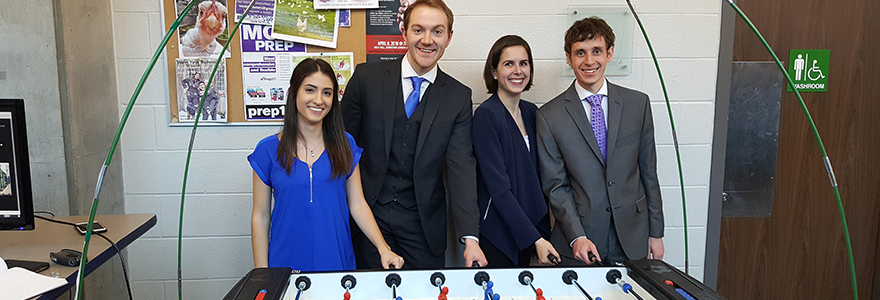Media
Contact
Communications Specialist
Faculty of Engineering
Spencer Engineering Building
Room 2072
Western University
Tel: 519-661-2111 ext. 87015
Email: engineeringcomms@uwo.ca
Students win National Design Competition for robotic Foosball opponent

Western Engineering News | June 18, 2018
The foosball market is growing worldwide year after year and is expected to reach over $460 million USD by 2021. However, table sports all share one major disadvantage: players can’t play on their own.
A team of four Western Engineering undergraduate students with a shared passion for Foosball recognized this disadvantage and were inspired to revolutionize the game by designing and building an automated foosball table that served as an opponent to a human player.
As part of Western’s Capstone Design Project, Daniela Arcese (4th year Software Engineering), Tyler Lacroix (4th year Mechatronics Systems Engineering), Robert Meagher (5th year Mechatronics and Computer Science dual degree) and Evaline Warmels (4th year Mechatronics Systems Engineering), created Foosball Opponent via Autonomous Robotics (FOvAR) – an eight-degree-of-freedom robotic system that rotates and translates four rods of the foosball table using eight stepper motors (two per rod).
“Since this is everyone's final year, it was our last chance to use the resources available at Western to make something we thought would be revolutionary to the table sport we cherish,” said team captain Tyler Lacroix.
After winning Western’s Best Mechatronics Capstone Project in April 2018, the team was encouraged to compete in the Canadian Society for Mechanical Engineering (CSME) National Design Competition by their Capstone project advisor, Electrical and Computer Engineering professor, Abbas Samani.
“This team was one of the most talented, organized and committed teams in my class among a very high achieving group of Mechatronic Systems Engineering students,” said Samani.
To enter the CSME National Design Competition, teams of engineering undergraduate students across Canada were required to submit an abstract, poster and short video describing the design and functionality of their projects.
“We learned so much in this project, from designing and manufacturing the mechanical parts, to designing and prototyping the electrical components, and coding the AI to the app,” said Lacroix. “We pretty much had to touch every technical component.”
Lacroix also referenced how the competition helped the team grow stronger together, recalling the long nights staying up until 5 a.m. finishing video editing and poster design.
“The competition was a great experience!” he said. “We were all super happy with the win, and I think it definitely helped validate the long, hundreds – if not thousands – of hours we spent on the project.”
Samani noted that the team’s proposed FOvAR project sounded too ambitious at first, given its high level of technical complexity. However, his skepticism soon turned into optimism, followed by excitement.
“I am very proud of the team's achievements,” said Samani. “I have no doubt that they will serve as outstanding ambassadors for Western throughout the next phases of their professional and academic lives.”

